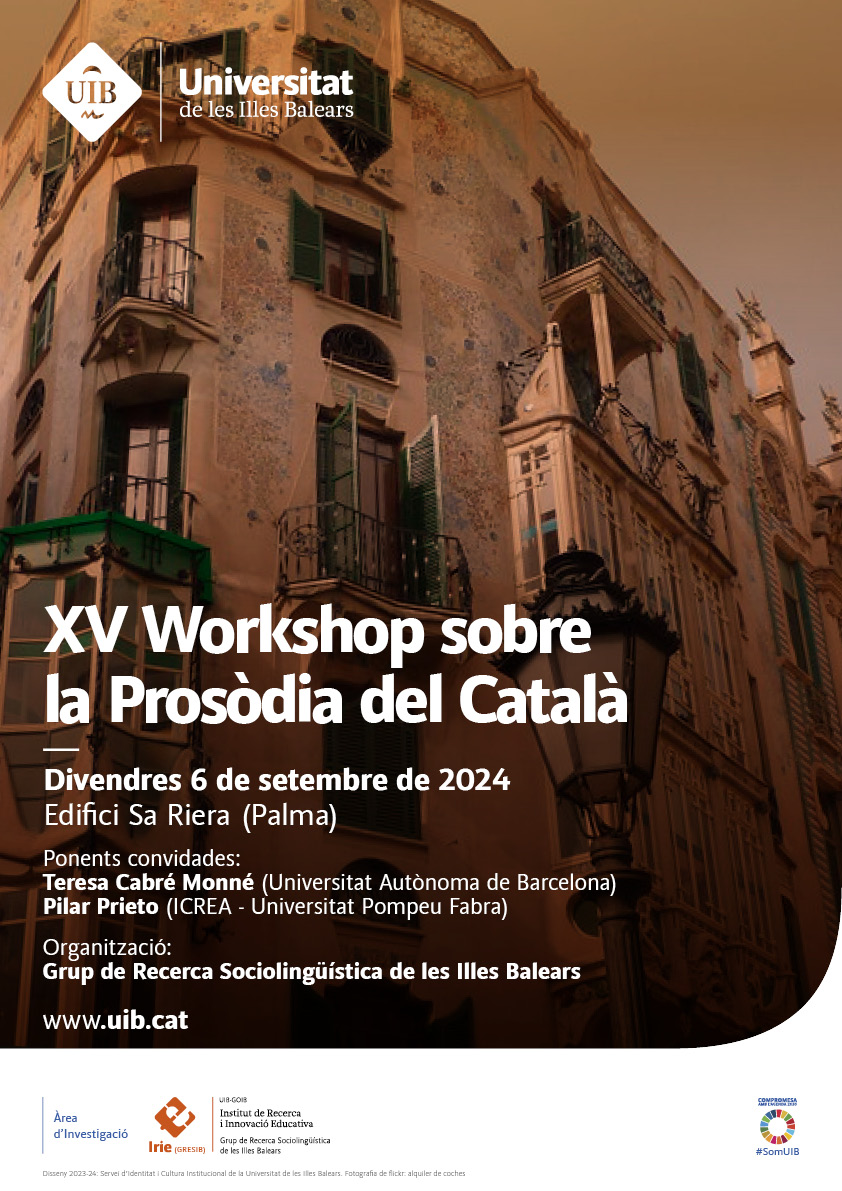
El Workshop sobre la Prosòdia del Català (anteriorment Workshop sobre entonació del català i Cat_ToBI) arriba a la 15a edició d’aniversari. El propòsit d’aquesta trobada és servir de fòrum de discussió i debat sobre la fonètica i la fonologia suprasegmentals del català, bé com a llengua inicial o com a llengua addicional, incloent-hi la recerca interdisciplinària en prosòdia del català.
El Workshop l’organitza una xarxa de grups de recerca de la Universitat de Barcelona, la Universitat Pompeu Fabra, l’Institut Menorquí d’Estudis i la Universitat de les Illes Balears. La 15a edició del workshop l’organitza la UIB i se celebrarà de forma presencial a l’edifici Sa Riera, Palma.
En aquesta ocasió d’aniversari, tendrem dues ponents convidades. La primera ponent convidada serà Teresa Cabré Monné, que oferirà la ponència «Patrons d’adaptació en els manlleus: accent i sistema vocàlic». I la segona ponent, Pilar Prieto, clourà el Workshop amb la ponència «La prosòdia i les seves interfícies: 15 anys del Workshop de Prosòdia del Català».
Dates importants:
- Termini per a la presentació de resums:
16 de juny23 de juny de 2024 - Notificació d’acceptació: 1 de juliol de 2024
- Publicació del programa: 8 de juliol de 2024
- Termini per a la inscripció: 26 de juliol de 2024
- Data del Workshop: 6 de setembre de 2024
Si teniu qualsevol dubte, ens podeu enviar un correu a aquesta adreça: workshop.prosodia@uib.cat.
Enllaços a edicions anteriors: 2023, 2022, 2021, 2019, 2018, 2017, 2016, 2015, 2014, 2013, 2012, 2011, 2010, 2009.
Convocatòria i format del resum
Convocatòria
Al Workshop sobre la Prosòdia del Català s’hi accepten resums sobre qualsevol aspecte de la prosòdia del català. També s’hi accepten contribucions relacionades amb la recerca interdisciplinària en prosòdia del català, incloent-hi la interfície entre prosòdia i pragmàtica, prosòdia i sintaxi, prosòdia i gestualitat, prosòdia i adquisició, entre d’altres. Els resums podran ser escrits en qualsevol llengua romànica (preferentment en català) o en anglès. Hi haurà un procés de selecció.
Format dels resums
Extensió: màxim una pàgina de text + una pàgina més per incloure-hi les referències bibliogràfiques i les figures
Marge de les pàgines: 2,5 cm a tots quatre costats (en format A4)
Tipus de lletra: Times New Roman, 12 pt
Espaiat interlineal: senzill.
Els resums s’han d’enviar en format PDF. Caldrà enviar dues versions del resum, una d’anònima i l’altra amb l’autoria.
Per a la versió amb l’autoria:
1a línia: el títol centrat en negreta + una línia en blanc
2a línia: el/s nom/s i cognoms de l’/dels autor/s centrat/s
3a línia: les respectives afiliacions
4a línia: els correus electrònic
Podeu enviar els resums (la còpia anònima i la còpia amb l’autoria) per correu electrònic abans del 16 de juny de 2024, a l’adreça electrònica següent: workshop.prosodia@uib.cat.
Comitès
Comitè organitzador
Mariia Pronina (Universitat de les Illes Balears)
Francesc Torres-Tamarit (Universitat Autònoma de Barcelona)
Maria del Mar Vanrell (Universitat de les Illes Balears)
Comitè permanent
Teresa Cabré Monné (Universitat Autònoma de Barcelona)
Núria Esteve-Gibert (Universitat Oberta de Catalunya)
Dolors Font (Universitat de Barcelona)
Ignasi Mascaró (Institut Menorquí d’Estudis)
Lourdes Romera (Universitat de Barcelona)
Pilar Prieto (ICREA – Universitat Pompeu Fabra)
Maria del Mar Vanrell (Universitat de les Illes Balears)
Programa
El programa ja es pot consultar a través del següent enllaç.
Inscripció
La participació és gratuïta i està oberta a tothom, però cal inscripció prèvia a través d’aquest formulari (termini: 26 de juliol de 2024).
Seu i allotjament
El XV Workshop sobre la Prosòdia del Català serà a la Sala d’Actes de l’edifici Sa Riera de la Universitat de les Illes Balears (c/ Miquel dels Sants Oliver, núm. 2, Palma).
Us recomanam que reserveu un hotel amb temps. A continuació hi trobareu algunes recomanacions:
Hotel Palladium ****
HM Jaime III ****
HM Balanguera ****
HM Palma Blanc ****
Hotel Continental ****
Hotel Nou Baleares ****
Protur Naisa Palma ****
UR Palacio Avenida ****
Innside Palma Center ****
Hotel Almudaina ****
Hotel Araxa ***
Hotel Abelay **
Hotel Abelux **
Hotel Born **













